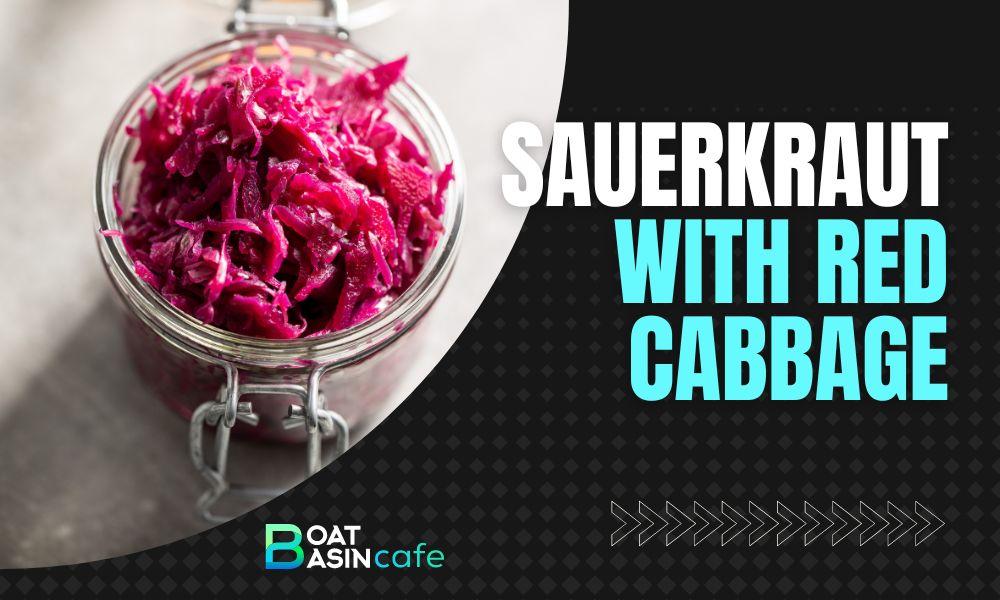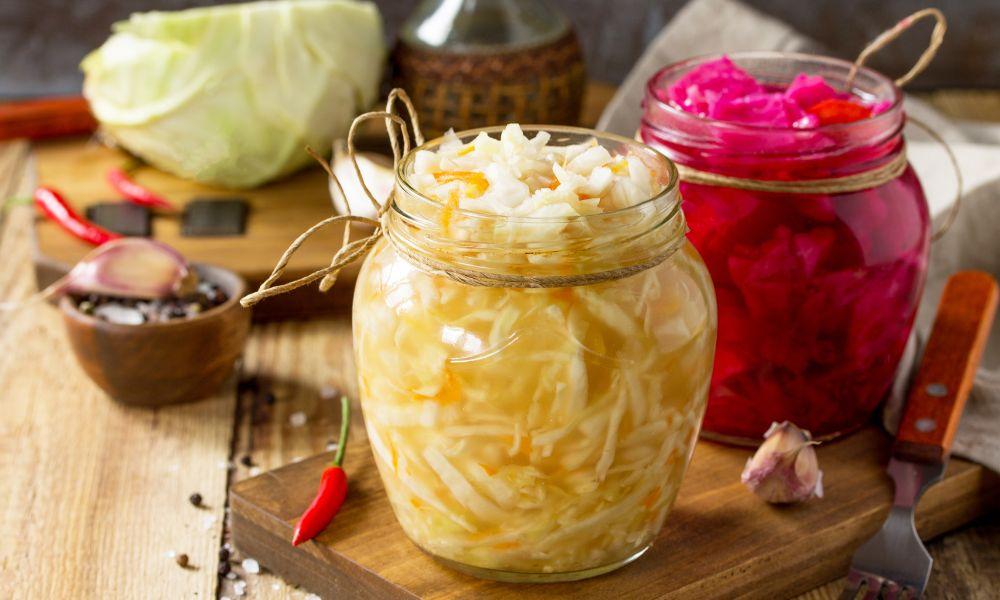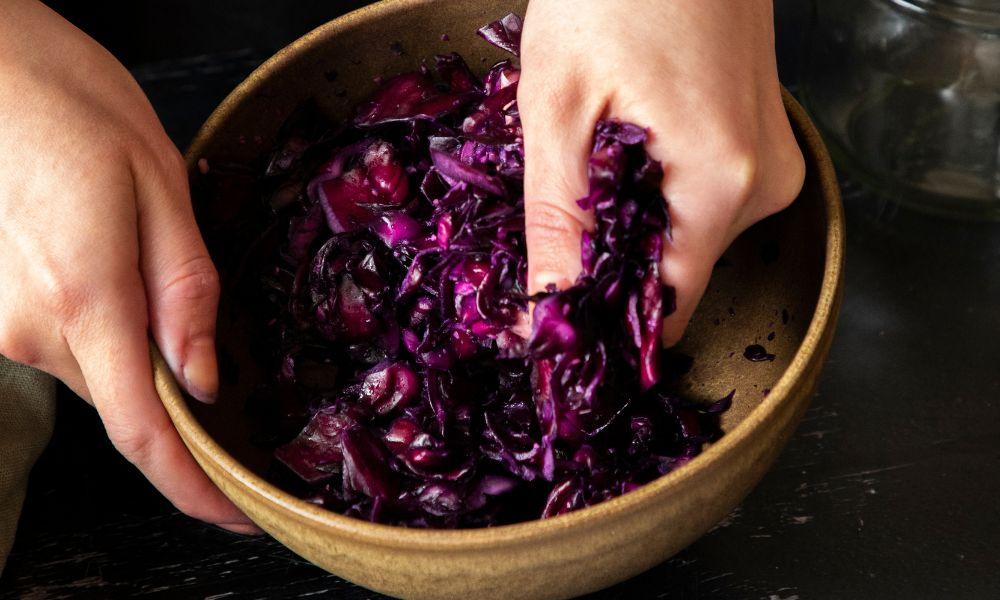Sauerkraut is a popular fermented cabbage dish with origins in Eastern Europe, traditionally using green cabbage. However, fermenting sauerkraut with red cabbage has increasingly gained traction among fermentation enthusiasts, thanks to its unique flavor and vibrant color.
In this article, we will explore the versatile world of red cabbage sauerkraut and learn how to make your own delightful fermented cabbage goodness at home!

The Science Behind Sauerkraut Fermentation
Before delving into making delicious red cabbage sauerkraut, it’s essential to understand the science behind the process. Fermented sauerkraut is achieved through a process called lacto-fermentation. This involves lactic acid bacteria breaking down sugars in the cabbage and creating an acidic environment that is inhospitable for harmful bacteria.
Lactic acid bacteria, such as Lactobacillus, play a crucial role in sauerkraut fermentation. They are naturally present on the surface of vegetables, and when combined with salt and sugar, they produce lactic acid from the breakdown of carbohydrates. This process gives sauerkraut its tangy flavor.
Beyond its unique taste, sauerkraut boasts numerous health benefits. The fermentation process creates probiotics, which can improve digestion and support a healthy gut. Additionally, the fiber-rich content of cabbage promotes a healthy digestive system and encourages the growth of beneficial bacteria in your gut.
Red Cabbage vs. Green Cabbage for Sauerkraut

Many people wonder, “Can you make sauerkraut with red cabbage?” The answer is a resounding yes! Despite being less popular for sauerkraut production, red cabbage offers a unique twist on the traditional fermented dish.
The primary difference between red and green cabbage is their varying color and taste. Red cabbage has a more vibrant color due to the presence of anthocyanins, which are responsible for the red and purple hues found in various fruits and vegetables. The eye-catching color of red cabbage sauerkraut not only makes a beautiful addition to your plate but may also offer increased antioxidant benefits.
In terms of taste, red cabbage sauerkraut differs slightly from its green counterpart. Red cabbage has a slightly sweeter flavor profile, which can yield a more complex and intriguing sauerkraut. Making sauerkraut with red cabbage opens up a world of experimentation with flavors and textures, as the vibrant hue and diverse taste blends seamlessly with other ingredients in your culinary masterpieces.
Step-by-Step Guide: Making Sauerkraut with Red Cabbage

Whether you’re a fermentation novice or an experienced fermenter, this step-by-step guide will walk you through the process of making red cabbage sauerkraut with ease.
Step 1: Gather Your Ingredients
To make red cabbage sauerkraut, you’ll need the following ingredients:
- 1 large red cabbage
- 1 to 2 tablespoons of sea salt
- Optional herbs or flavors (e.g., caraway seeds or garlic cloves)
Step 2: Clean Your Equipment
Before starting your fermentation journey, it’s essential to clean all your equipment thoroughly. This includes your cutting board, knife, fermentation vessel (such as a mason jar or fermentation crock), and a weight or object to press down on the cabbage. Proper sanitation helps prevent contamination during fermentation.
Step 3: Prepare Your Cabbage
First, remove the outer leaves of your red cabbage and set them aside. Then, carefully cut the cabbage in half, and remove the core. Next, chop the cabbage into thin shreds. Shredding the cabbage finely allows for increased surface area and better salt distribution, which aids in the fermentation process.
Step 4: Salt Your Cabbage
In a large mixing bowl, combine the shredded cabbage with the measured salt. The salt should be evenly distributed throughout the cabbage, using a ratio of approximately 2% salt by weight. This means, for every 100 grams of shredded cabbage, you’ll need 2 grams of salt.
Step 5: Massage Your Cabbage
Massaging your cabbage is an essential part of the fermentation process, as it helps release the natural juices and softens the cabbage. Using your hands, gently squeeze and massage the cabbage and salt mixture for approximately 10 minutes, or until the cabbage has released a significant amount of liquid. This brine is crucial for lacto-fermentation to occur.
Step 6: Pack Your Fermentation Vessel
Once the cabbage has released enough brine, it’s time to pack your fermentation vessel. Begin by carefully transferring the cabbage mixture into your jar or crock, pressing it down firmly as you go. The goal is to remove any trapped air bubbles and ensure the cabbage is submerged under the brine. Once the jar is filled, place a weight (or a clean cabbage leaf) on top to keep the cabbage beneath the brine.
Step 7: Monitor Your Fermentation
Fermentation durations vary depending on temperature and personal taste preferences. It’s essential to periodically check your red cabbage sauerkraut during fermentation to observe its progress and ensure there are no issues with mold or off smells. Typically, the fermentation process can take anywhere from 1 to 4 weeks.
That’s it! You’ve made your own red cabbage sauerkraut.
Flavor Variations and Recipe Ideas

Now that you’ve made your very own red cabbage sauerkraut, it’s time to get creative with flavor variations and recipe ideas. The distinct sweet taste and impressive color of red cabbage sauerkraut can elevate many dishes, offering endless possibilities for culinary exploration.
Consider experimenting with different herbs, spices, or other vegetables when preparing your red cabbage sauerkraut. Some popular flavor additions include caraway seeds, garlic cloves, jalapeño peppers, or even apples for a touch of fruity sweetness.
Incorporating Red Cabbage Sauerkraut in Salads
The vibrant color of red cabbage sauerkraut can be a standout ingredient in salads. Combine it with mixed greens, cherry tomatoes, sliced cucumbers, and a tangy vinaigrette for a refreshing and nutritious dish.
Using Red Cabbage Sauerkraut in Sandwiches
Layer your red cabbage sauerkraut on sandwiches for an added punch of flavor and texture. It pairs particularly well with deli meats, such as pastrami, corned beef, or roast turkey. You can also use red cabbage sauerkraut as a topping for veggie or vegan burgers.
Creating Unique Sauerkraut Blends
For a truly memorable sauerkraut experience, try creating a colorful blend of red and green cabbage. Combine equal parts shredded red and green cabbage during the salting and massaging process to create a visually stunning and flavorful sauerkraut that marries the best of both worlds.
FAQs
Can red cabbage be used to make sauerkraut?
Absolutely! Red cabbage can be used to make sauerkraut, and it adds a unique, vibrant color and slightly sweeter flavor profile to the fermented dish.
How does red cabbage sauerkraut differ in taste compared to traditional sauerkraut?
Red cabbage sauerkraut has a slightly sweeter taste compared to traditional green cabbage sauerkraut. It also boasts a vibrant color that adds visual appeal to many dishes.
What is the fermentation time required for red cabbage sauerkraut?
The fermentation time for red cabbage sauerkraut is typically between 1 to 4 weeks, depending on factors such as temperature and personal taste preferences.
Can I use red and green cabbage together for a unique sauerkraut blend?
Yes! Combining red and green cabbage during the salting and massaging process results in a visually stunning and flavorful sauerkraut that marries the best of both worlds.
Conclusion
Making sauerkraut using red cabbage is an excellent way to unleash new flavors and add a pop of color to your culinary creations. By following our step-by-step guide and experimenting with various flavor combinations, you too can enjoy the many benefits and taste sensations that homemade red cabbage sauerkraut has to offer.
So why wait? Start your fermentation journey with red cabbage and enjoy a fun, delicious, and healthy experience that’s sure to delight your taste buds!
You may also like: 12 Crunchy Substitutes for Red Cabbage with an Amazing Taste